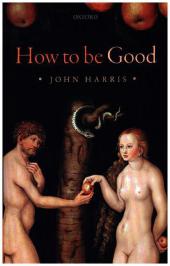 Neuerscheinungen 2016Stand: 2020-02-01 |
Schnellsuche
ISBN/Stichwort/Autor
|
Herderstraße 10
10625 Berlin
Tel.: 030 315 714 16
Fax 030 315 714 14
info@buchspektrum.de |

John Harris
How to be Good
The Possibility of Moral Enhancement
2016. 210 S. 222 mm
Verlag/Jahr: OXFORD UNIVERSITY PRESS; OUP OXFORD 2016
ISBN: 0-19-870759-2 (0198707592)
Neue ISBN: 978-0-19-870759-2 (9780198707592)
Preis und Lieferzeit: Bitte klicken
Knowing how to be good is immensely important. The same goes for knowing how to make others be good-otherwise known as ´moral enhancement´. John Harris explores the many varied approaches to moral enhancement, from setting a good example to imbibing mood-altering substances, and asks whether and to what extent moral enhancement is possible.
´How to be Good?´ is the pre-eminent question for ethics, although one that philosophers and ethicists seldom address head on. Knowing how to be good, or perhaps (more modestly and more accurately) knowing how to go about trying to be good, and the ways in which it is pointless or self-defeating to try to be good, is of immense theoretical and practical importance. And what goes for trying to be good oneself, goes also for trying to provide others with ways of being
good, and for trying to make them good whether they like it or not. This is what is meant by ´moral enhancement´.
There are many proposed methodologies or technologies for moral enhancement. Some of them are ancient and/or familiar: we may attempt moral enhancement by setting a good example, by good parenting, by education or training, by peer pressure, by telling stories with a moral, in words or in pictures, and so on. We can imbibe substances with mood changing or motivational effects. We can also use medical, biological, or other scientific means; we can search for and deploy chemicals, or biological
or molecular agents, which we believe will change people for the better; and we can modify the environment to make bad outcomes of all sorts less likely. We can experiment with political and social systems, institutions, and arrangements designed to make the world a better place or people better
people. The question whether and to what extent moral enhancement is possible is the subject of this book.
One strength of the book is that it is rich with fruitful and overlapping questions about the nature of morality and moral education. It provides a treasure chest of questions for those looking for research programs to develop on the topic. Some of the main questions Harris examines are urgent and pressing social and ethical problems. Daniel Moseley, Notre Dame Philosophical Reviews
John Harris is Emeritus Professor of Bioethics at the University of Manchester. His books include: The Value of Life (Routledge, 1985), Wonderwoman and Superman (OUP, 1992), Clones Genes and Immortality (OUP, 1998). He is the author or editor of twenty books and over three hundred and fifty papers.


